Leadership Analysis of Alex Ferguson
VerifiedAdded on 2022/11/13
|11
|3203
|246
AI Summary
This article provides a leadership analysis of Alex Ferguson, the former manager of Manchester United. It discusses his leadership style, skills, and success formula. The article also highlights the transferable leadership skills that can be learned from his leadership approach.
Contribute Materials
Your contribution can guide someone’s learning journey. Share your
documents today.
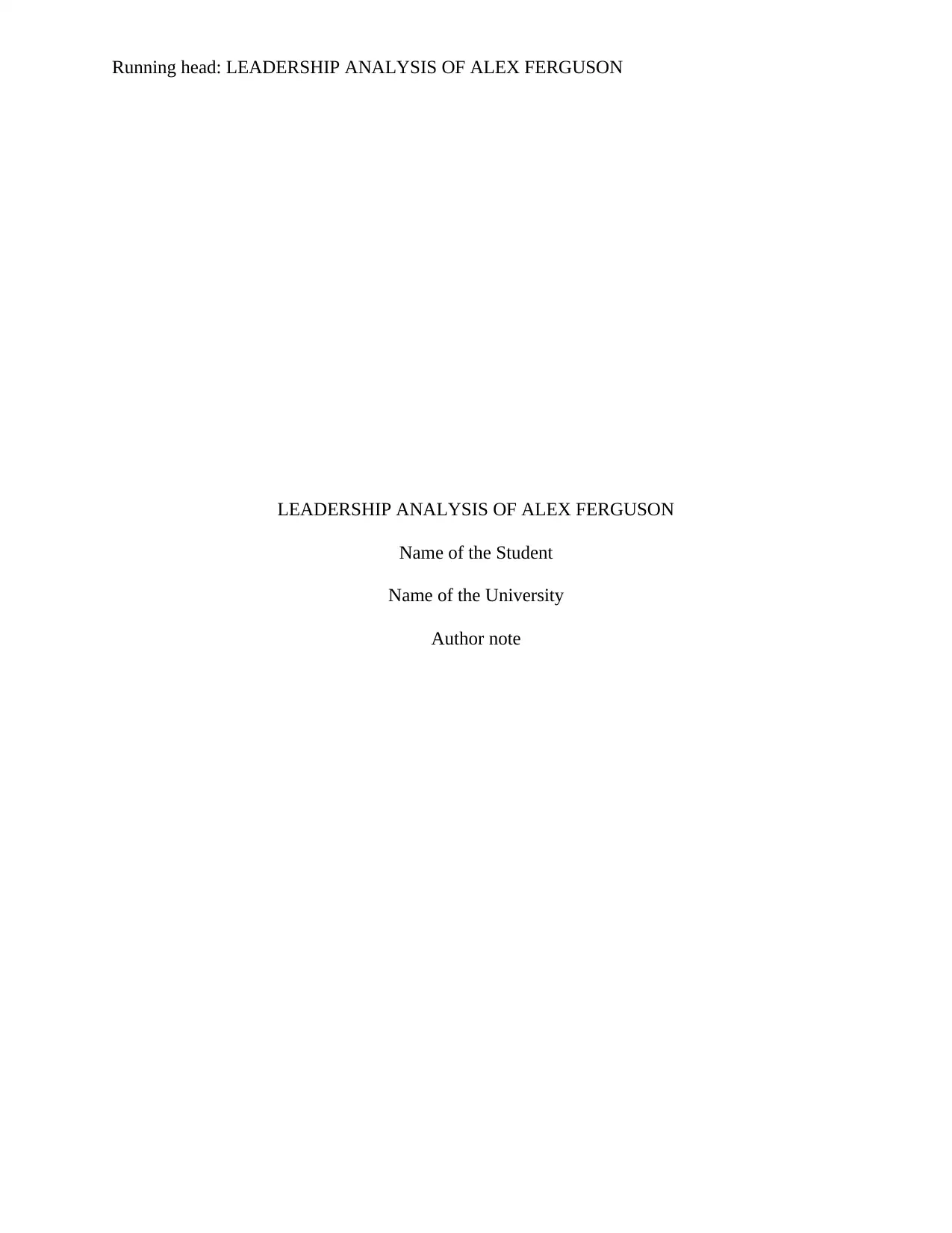
Running head: LEADERSHIP ANALYSIS OF ALEX FERGUSON
LEADERSHIP ANALYSIS OF ALEX FERGUSON
Name of the Student
Name of the University
Author note
LEADERSHIP ANALYSIS OF ALEX FERGUSON
Name of the Student
Name of the University
Author note
Secure Best Marks with AI Grader
Need help grading? Try our AI Grader for instant feedback on your assignments.
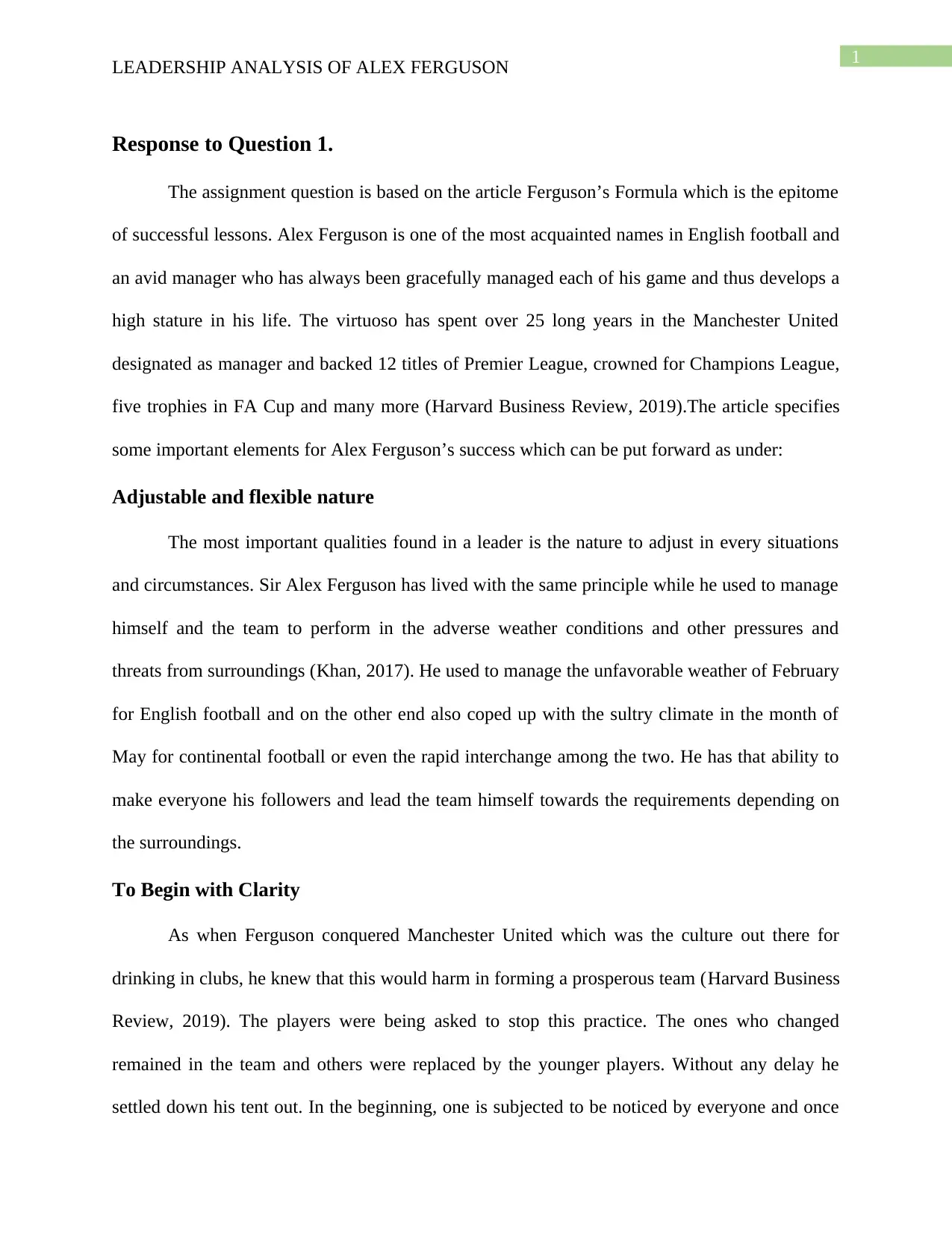
1
LEADERSHIP ANALYSIS OF ALEX FERGUSON
Response to Question 1.
The assignment question is based on the article Ferguson’s Formula which is the epitome
of successful lessons. Alex Ferguson is one of the most acquainted names in English football and
an avid manager who has always been gracefully managed each of his game and thus develops a
high stature in his life. The virtuoso has spent over 25 long years in the Manchester United
designated as manager and backed 12 titles of Premier League, crowned for Champions League,
five trophies in FA Cup and many more (Harvard Business Review, 2019).The article specifies
some important elements for Alex Ferguson’s success which can be put forward as under:
Adjustable and flexible nature
The most important qualities found in a leader is the nature to adjust in every situations
and circumstances. Sir Alex Ferguson has lived with the same principle while he used to manage
himself and the team to perform in the adverse weather conditions and other pressures and
threats from surroundings (Khan, 2017). He used to manage the unfavorable weather of February
for English football and on the other end also coped up with the sultry climate in the month of
May for continental football or even the rapid interchange among the two. He has that ability to
make everyone his followers and lead the team himself towards the requirements depending on
the surroundings.
To Begin with Clarity
As when Ferguson conquered Manchester United which was the culture out there for
drinking in clubs, he knew that this would harm in forming a prosperous team (Harvard Business
Review, 2019). The players were being asked to stop this practice. The ones who changed
remained in the team and others were replaced by the younger players. Without any delay he
settled down his tent out. In the beginning, one is subjected to be noticed by everyone and once
LEADERSHIP ANALYSIS OF ALEX FERGUSON
Response to Question 1.
The assignment question is based on the article Ferguson’s Formula which is the epitome
of successful lessons. Alex Ferguson is one of the most acquainted names in English football and
an avid manager who has always been gracefully managed each of his game and thus develops a
high stature in his life. The virtuoso has spent over 25 long years in the Manchester United
designated as manager and backed 12 titles of Premier League, crowned for Champions League,
five trophies in FA Cup and many more (Harvard Business Review, 2019).The article specifies
some important elements for Alex Ferguson’s success which can be put forward as under:
Adjustable and flexible nature
The most important qualities found in a leader is the nature to adjust in every situations
and circumstances. Sir Alex Ferguson has lived with the same principle while he used to manage
himself and the team to perform in the adverse weather conditions and other pressures and
threats from surroundings (Khan, 2017). He used to manage the unfavorable weather of February
for English football and on the other end also coped up with the sultry climate in the month of
May for continental football or even the rapid interchange among the two. He has that ability to
make everyone his followers and lead the team himself towards the requirements depending on
the surroundings.
To Begin with Clarity
As when Ferguson conquered Manchester United which was the culture out there for
drinking in clubs, he knew that this would harm in forming a prosperous team (Harvard Business
Review, 2019). The players were being asked to stop this practice. The ones who changed
remained in the team and others were replaced by the younger players. Without any delay he
settled down his tent out. In the beginning, one is subjected to be noticed by everyone and once
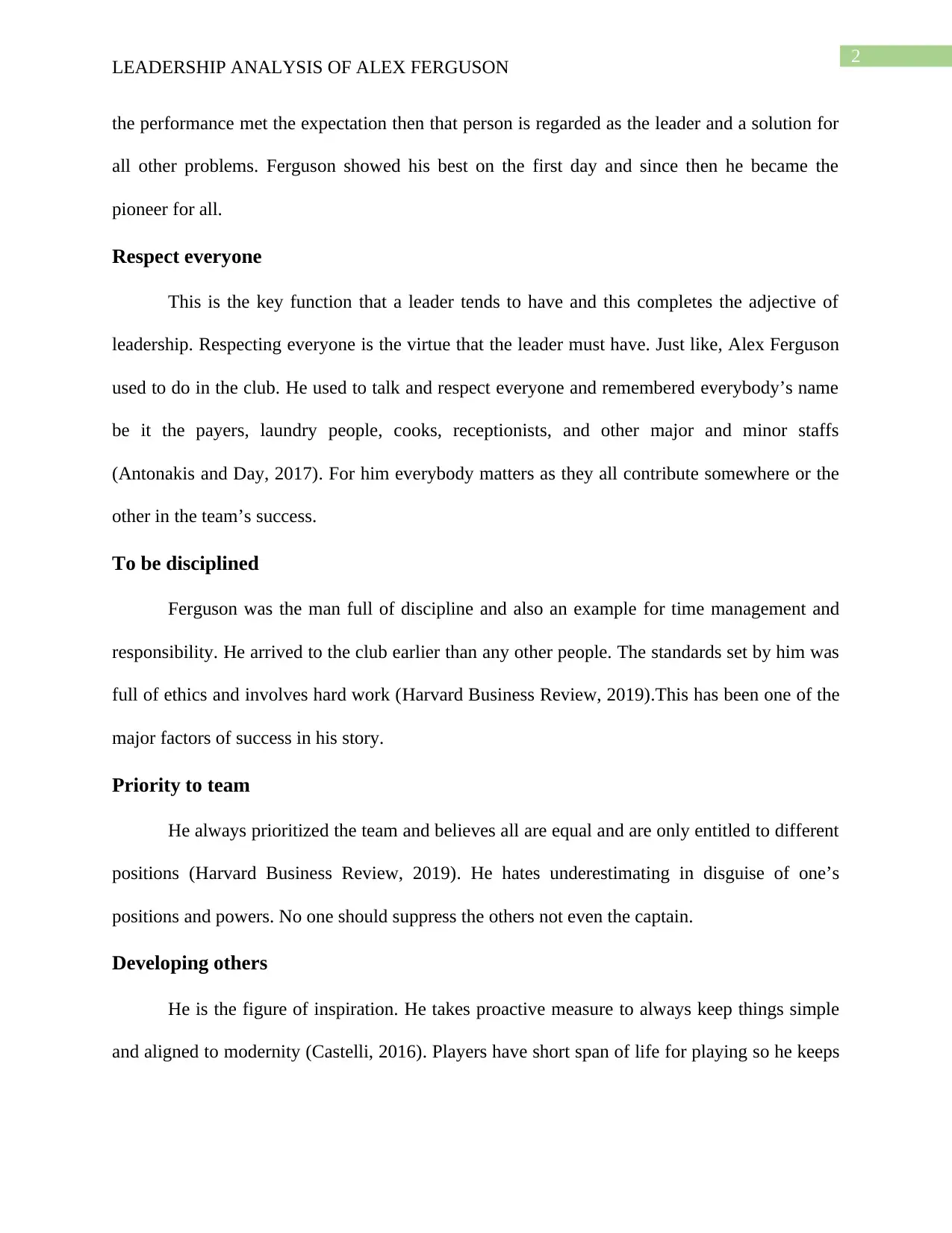
2
LEADERSHIP ANALYSIS OF ALEX FERGUSON
the performance met the expectation then that person is regarded as the leader and a solution for
all other problems. Ferguson showed his best on the first day and since then he became the
pioneer for all.
Respect everyone
This is the key function that a leader tends to have and this completes the adjective of
leadership. Respecting everyone is the virtue that the leader must have. Just like, Alex Ferguson
used to do in the club. He used to talk and respect everyone and remembered everybody’s name
be it the payers, laundry people, cooks, receptionists, and other major and minor staffs
(Antonakis and Day, 2017). For him everybody matters as they all contribute somewhere or the
other in the team’s success.
To be disciplined
Ferguson was the man full of discipline and also an example for time management and
responsibility. He arrived to the club earlier than any other people. The standards set by him was
full of ethics and involves hard work (Harvard Business Review, 2019).This has been one of the
major factors of success in his story.
Priority to team
He always prioritized the team and believes all are equal and are only entitled to different
positions (Harvard Business Review, 2019). He hates underestimating in disguise of one’s
positions and powers. No one should suppress the others not even the captain.
Developing others
He is the figure of inspiration. He takes proactive measure to always keep things simple
and aligned to modernity (Castelli, 2016). Players have short span of life for playing so he keeps
LEADERSHIP ANALYSIS OF ALEX FERGUSON
the performance met the expectation then that person is regarded as the leader and a solution for
all other problems. Ferguson showed his best on the first day and since then he became the
pioneer for all.
Respect everyone
This is the key function that a leader tends to have and this completes the adjective of
leadership. Respecting everyone is the virtue that the leader must have. Just like, Alex Ferguson
used to do in the club. He used to talk and respect everyone and remembered everybody’s name
be it the payers, laundry people, cooks, receptionists, and other major and minor staffs
(Antonakis and Day, 2017). For him everybody matters as they all contribute somewhere or the
other in the team’s success.
To be disciplined
Ferguson was the man full of discipline and also an example for time management and
responsibility. He arrived to the club earlier than any other people. The standards set by him was
full of ethics and involves hard work (Harvard Business Review, 2019).This has been one of the
major factors of success in his story.
Priority to team
He always prioritized the team and believes all are equal and are only entitled to different
positions (Harvard Business Review, 2019). He hates underestimating in disguise of one’s
positions and powers. No one should suppress the others not even the captain.
Developing others
He is the figure of inspiration. He takes proactive measure to always keep things simple
and aligned to modernity (Castelli, 2016). Players have short span of life for playing so he keeps
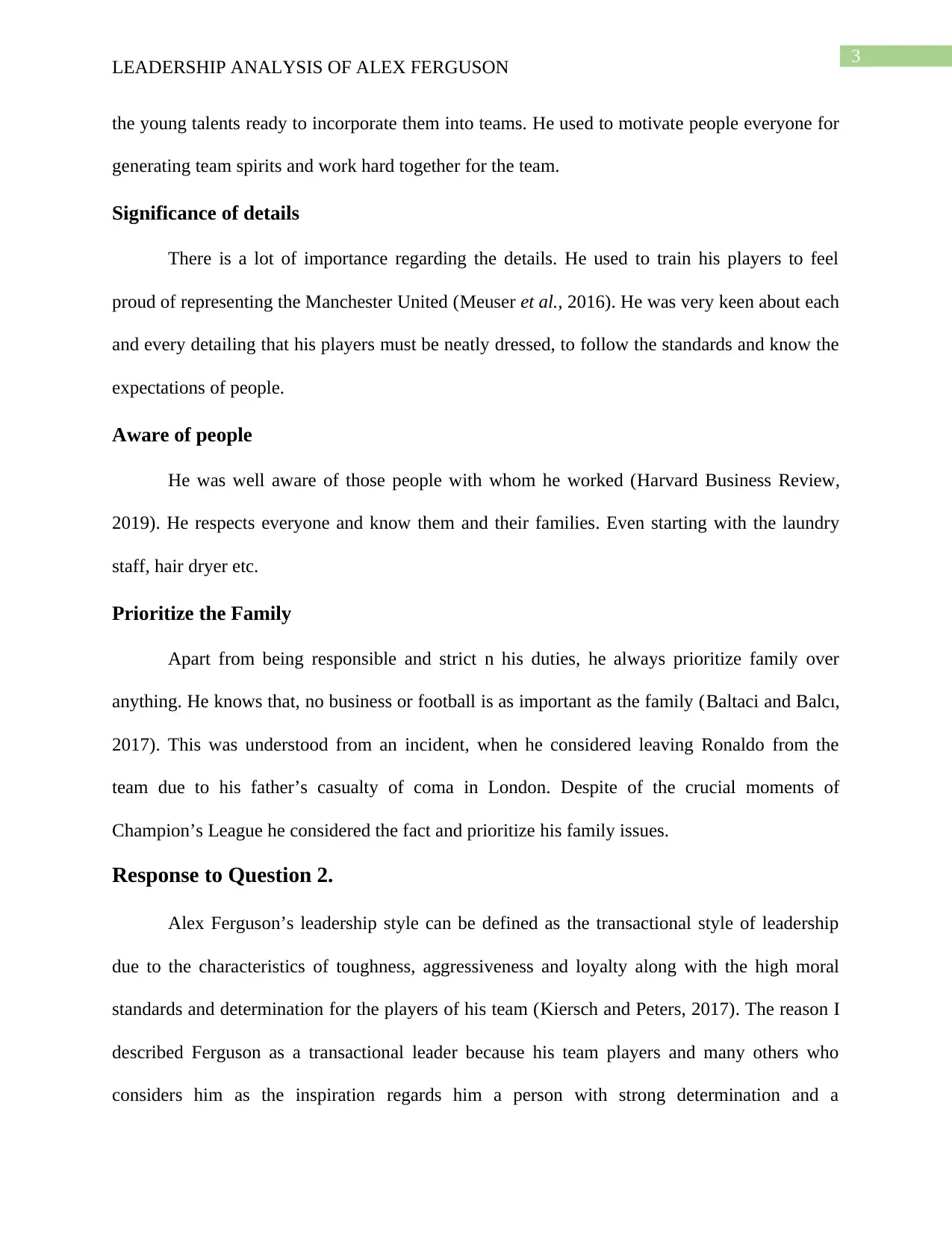
3
LEADERSHIP ANALYSIS OF ALEX FERGUSON
the young talents ready to incorporate them into teams. He used to motivate people everyone for
generating team spirits and work hard together for the team.
Significance of details
There is a lot of importance regarding the details. He used to train his players to feel
proud of representing the Manchester United (Meuser et al., 2016). He was very keen about each
and every detailing that his players must be neatly dressed, to follow the standards and know the
expectations of people.
Aware of people
He was well aware of those people with whom he worked (Harvard Business Review,
2019). He respects everyone and know them and their families. Even starting with the laundry
staff, hair dryer etc.
Prioritize the Family
Apart from being responsible and strict n his duties, he always prioritize family over
anything. He knows that, no business or football is as important as the family (Baltaci and Balcı,
2017). This was understood from an incident, when he considered leaving Ronaldo from the
team due to his father’s casualty of coma in London. Despite of the crucial moments of
Champion’s League he considered the fact and prioritize his family issues.
Response to Question 2.
Alex Ferguson’s leadership style can be defined as the transactional style of leadership
due to the characteristics of toughness, aggressiveness and loyalty along with the high moral
standards and determination for the players of his team (Kiersch and Peters, 2017). The reason I
described Ferguson as a transactional leader because his team players and many others who
considers him as the inspiration regards him a person with strong determination and a
LEADERSHIP ANALYSIS OF ALEX FERGUSON
the young talents ready to incorporate them into teams. He used to motivate people everyone for
generating team spirits and work hard together for the team.
Significance of details
There is a lot of importance regarding the details. He used to train his players to feel
proud of representing the Manchester United (Meuser et al., 2016). He was very keen about each
and every detailing that his players must be neatly dressed, to follow the standards and know the
expectations of people.
Aware of people
He was well aware of those people with whom he worked (Harvard Business Review,
2019). He respects everyone and know them and their families. Even starting with the laundry
staff, hair dryer etc.
Prioritize the Family
Apart from being responsible and strict n his duties, he always prioritize family over
anything. He knows that, no business or football is as important as the family (Baltaci and Balcı,
2017). This was understood from an incident, when he considered leaving Ronaldo from the
team due to his father’s casualty of coma in London. Despite of the crucial moments of
Champion’s League he considered the fact and prioritize his family issues.
Response to Question 2.
Alex Ferguson’s leadership style can be defined as the transactional style of leadership
due to the characteristics of toughness, aggressiveness and loyalty along with the high moral
standards and determination for the players of his team (Kiersch and Peters, 2017). The reason I
described Ferguson as a transactional leader because his team players and many others who
considers him as the inspiration regards him a person with strong determination and a
Secure Best Marks with AI Grader
Need help grading? Try our AI Grader for instant feedback on your assignments.
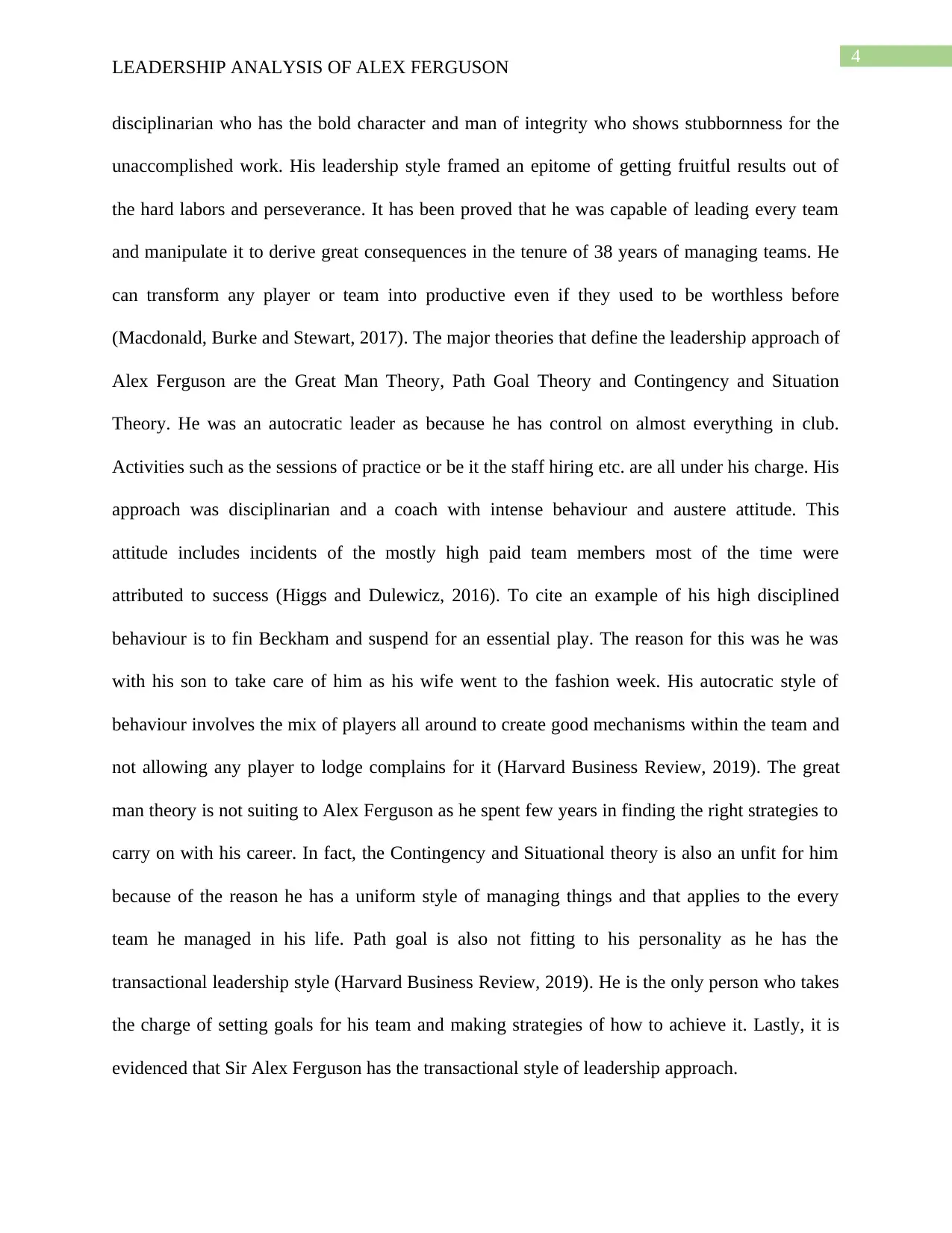
4
LEADERSHIP ANALYSIS OF ALEX FERGUSON
disciplinarian who has the bold character and man of integrity who shows stubbornness for the
unaccomplished work. His leadership style framed an epitome of getting fruitful results out of
the hard labors and perseverance. It has been proved that he was capable of leading every team
and manipulate it to derive great consequences in the tenure of 38 years of managing teams. He
can transform any player or team into productive even if they used to be worthless before
(Macdonald, Burke and Stewart, 2017). The major theories that define the leadership approach of
Alex Ferguson are the Great Man Theory, Path Goal Theory and Contingency and Situation
Theory. He was an autocratic leader as because he has control on almost everything in club.
Activities such as the sessions of practice or be it the staff hiring etc. are all under his charge. His
approach was disciplinarian and a coach with intense behaviour and austere attitude. This
attitude includes incidents of the mostly high paid team members most of the time were
attributed to success (Higgs and Dulewicz, 2016). To cite an example of his high disciplined
behaviour is to fin Beckham and suspend for an essential play. The reason for this was he was
with his son to take care of him as his wife went to the fashion week. His autocratic style of
behaviour involves the mix of players all around to create good mechanisms within the team and
not allowing any player to lodge complains for it (Harvard Business Review, 2019). The great
man theory is not suiting to Alex Ferguson as he spent few years in finding the right strategies to
carry on with his career. In fact, the Contingency and Situational theory is also an unfit for him
because of the reason he has a uniform style of managing things and that applies to the every
team he managed in his life. Path goal is also not fitting to his personality as he has the
transactional leadership style (Harvard Business Review, 2019). He is the only person who takes
the charge of setting goals for his team and making strategies of how to achieve it. Lastly, it is
evidenced that Sir Alex Ferguson has the transactional style of leadership approach.
LEADERSHIP ANALYSIS OF ALEX FERGUSON
disciplinarian who has the bold character and man of integrity who shows stubbornness for the
unaccomplished work. His leadership style framed an epitome of getting fruitful results out of
the hard labors and perseverance. It has been proved that he was capable of leading every team
and manipulate it to derive great consequences in the tenure of 38 years of managing teams. He
can transform any player or team into productive even if they used to be worthless before
(Macdonald, Burke and Stewart, 2017). The major theories that define the leadership approach of
Alex Ferguson are the Great Man Theory, Path Goal Theory and Contingency and Situation
Theory. He was an autocratic leader as because he has control on almost everything in club.
Activities such as the sessions of practice or be it the staff hiring etc. are all under his charge. His
approach was disciplinarian and a coach with intense behaviour and austere attitude. This
attitude includes incidents of the mostly high paid team members most of the time were
attributed to success (Higgs and Dulewicz, 2016). To cite an example of his high disciplined
behaviour is to fin Beckham and suspend for an essential play. The reason for this was he was
with his son to take care of him as his wife went to the fashion week. His autocratic style of
behaviour involves the mix of players all around to create good mechanisms within the team and
not allowing any player to lodge complains for it (Harvard Business Review, 2019). The great
man theory is not suiting to Alex Ferguson as he spent few years in finding the right strategies to
carry on with his career. In fact, the Contingency and Situational theory is also an unfit for him
because of the reason he has a uniform style of managing things and that applies to the every
team he managed in his life. Path goal is also not fitting to his personality as he has the
transactional leadership style (Harvard Business Review, 2019). He is the only person who takes
the charge of setting goals for his team and making strategies of how to achieve it. Lastly, it is
evidenced that Sir Alex Ferguson has the transactional style of leadership approach.
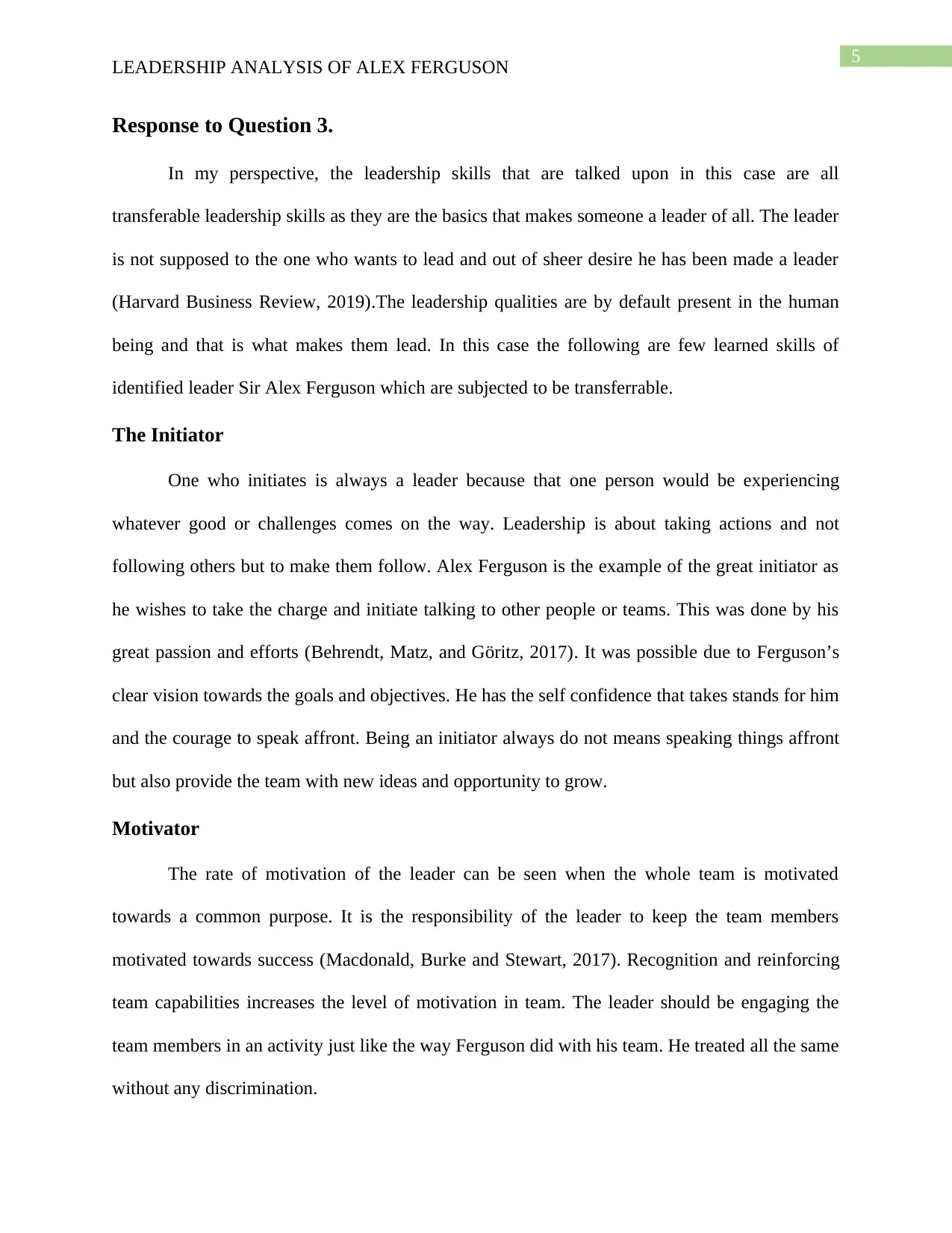
5
LEADERSHIP ANALYSIS OF ALEX FERGUSON
Response to Question 3.
In my perspective, the leadership skills that are talked upon in this case are all
transferable leadership skills as they are the basics that makes someone a leader of all. The leader
is not supposed to the one who wants to lead and out of sheer desire he has been made a leader
(Harvard Business Review, 2019).The leadership qualities are by default present in the human
being and that is what makes them lead. In this case the following are few learned skills of
identified leader Sir Alex Ferguson which are subjected to be transferrable.
The Initiator
One who initiates is always a leader because that one person would be experiencing
whatever good or challenges comes on the way. Leadership is about taking actions and not
following others but to make them follow. Alex Ferguson is the example of the great initiator as
he wishes to take the charge and initiate talking to other people or teams. This was done by his
great passion and efforts (Behrendt, Matz, and Göritz, 2017). It was possible due to Ferguson’s
clear vision towards the goals and objectives. He has the self confidence that takes stands for him
and the courage to speak affront. Being an initiator always do not means speaking things affront
but also provide the team with new ideas and opportunity to grow.
Motivator
The rate of motivation of the leader can be seen when the whole team is motivated
towards a common purpose. It is the responsibility of the leader to keep the team members
motivated towards success (Macdonald, Burke and Stewart, 2017). Recognition and reinforcing
team capabilities increases the level of motivation in team. The leader should be engaging the
team members in an activity just like the way Ferguson did with his team. He treated all the same
without any discrimination.
LEADERSHIP ANALYSIS OF ALEX FERGUSON
Response to Question 3.
In my perspective, the leadership skills that are talked upon in this case are all
transferable leadership skills as they are the basics that makes someone a leader of all. The leader
is not supposed to the one who wants to lead and out of sheer desire he has been made a leader
(Harvard Business Review, 2019).The leadership qualities are by default present in the human
being and that is what makes them lead. In this case the following are few learned skills of
identified leader Sir Alex Ferguson which are subjected to be transferrable.
The Initiator
One who initiates is always a leader because that one person would be experiencing
whatever good or challenges comes on the way. Leadership is about taking actions and not
following others but to make them follow. Alex Ferguson is the example of the great initiator as
he wishes to take the charge and initiate talking to other people or teams. This was done by his
great passion and efforts (Behrendt, Matz, and Göritz, 2017). It was possible due to Ferguson’s
clear vision towards the goals and objectives. He has the self confidence that takes stands for him
and the courage to speak affront. Being an initiator always do not means speaking things affront
but also provide the team with new ideas and opportunity to grow.
Motivator
The rate of motivation of the leader can be seen when the whole team is motivated
towards a common purpose. It is the responsibility of the leader to keep the team members
motivated towards success (Macdonald, Burke and Stewart, 2017). Recognition and reinforcing
team capabilities increases the level of motivation in team. The leader should be engaging the
team members in an activity just like the way Ferguson did with his team. He treated all the same
without any discrimination.
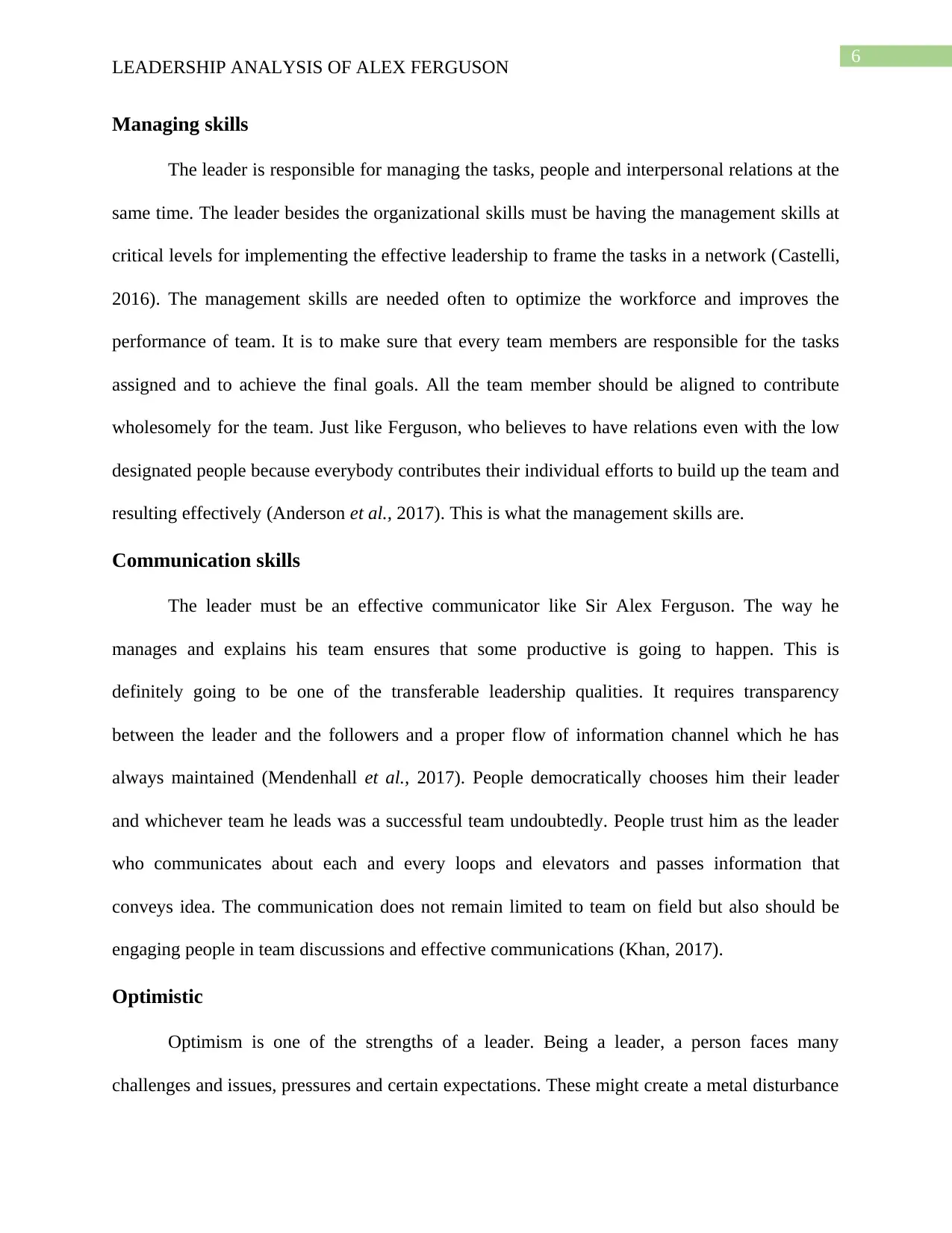
6
LEADERSHIP ANALYSIS OF ALEX FERGUSON
Managing skills
The leader is responsible for managing the tasks, people and interpersonal relations at the
same time. The leader besides the organizational skills must be having the management skills at
critical levels for implementing the effective leadership to frame the tasks in a network (Castelli,
2016). The management skills are needed often to optimize the workforce and improves the
performance of team. It is to make sure that every team members are responsible for the tasks
assigned and to achieve the final goals. All the team member should be aligned to contribute
wholesomely for the team. Just like Ferguson, who believes to have relations even with the low
designated people because everybody contributes their individual efforts to build up the team and
resulting effectively (Anderson et al., 2017). This is what the management skills are.
Communication skills
The leader must be an effective communicator like Sir Alex Ferguson. The way he
manages and explains his team ensures that some productive is going to happen. This is
definitely going to be one of the transferable leadership qualities. It requires transparency
between the leader and the followers and a proper flow of information channel which he has
always maintained (Mendenhall et al., 2017). People democratically chooses him their leader
and whichever team he leads was a successful team undoubtedly. People trust him as the leader
who communicates about each and every loops and elevators and passes information that
conveys idea. The communication does not remain limited to team on field but also should be
engaging people in team discussions and effective communications (Khan, 2017).
Optimistic
Optimism is one of the strengths of a leader. Being a leader, a person faces many
challenges and issues, pressures and certain expectations. These might create a metal disturbance
LEADERSHIP ANALYSIS OF ALEX FERGUSON
Managing skills
The leader is responsible for managing the tasks, people and interpersonal relations at the
same time. The leader besides the organizational skills must be having the management skills at
critical levels for implementing the effective leadership to frame the tasks in a network (Castelli,
2016). The management skills are needed often to optimize the workforce and improves the
performance of team. It is to make sure that every team members are responsible for the tasks
assigned and to achieve the final goals. All the team member should be aligned to contribute
wholesomely for the team. Just like Ferguson, who believes to have relations even with the low
designated people because everybody contributes their individual efforts to build up the team and
resulting effectively (Anderson et al., 2017). This is what the management skills are.
Communication skills
The leader must be an effective communicator like Sir Alex Ferguson. The way he
manages and explains his team ensures that some productive is going to happen. This is
definitely going to be one of the transferable leadership qualities. It requires transparency
between the leader and the followers and a proper flow of information channel which he has
always maintained (Mendenhall et al., 2017). People democratically chooses him their leader
and whichever team he leads was a successful team undoubtedly. People trust him as the leader
who communicates about each and every loops and elevators and passes information that
conveys idea. The communication does not remain limited to team on field but also should be
engaging people in team discussions and effective communications (Khan, 2017).
Optimistic
Optimism is one of the strengths of a leader. Being a leader, a person faces many
challenges and issues, pressures and certain expectations. These might create a metal disturbance
Paraphrase This Document
Need a fresh take? Get an instant paraphrase of this document with our AI Paraphraser
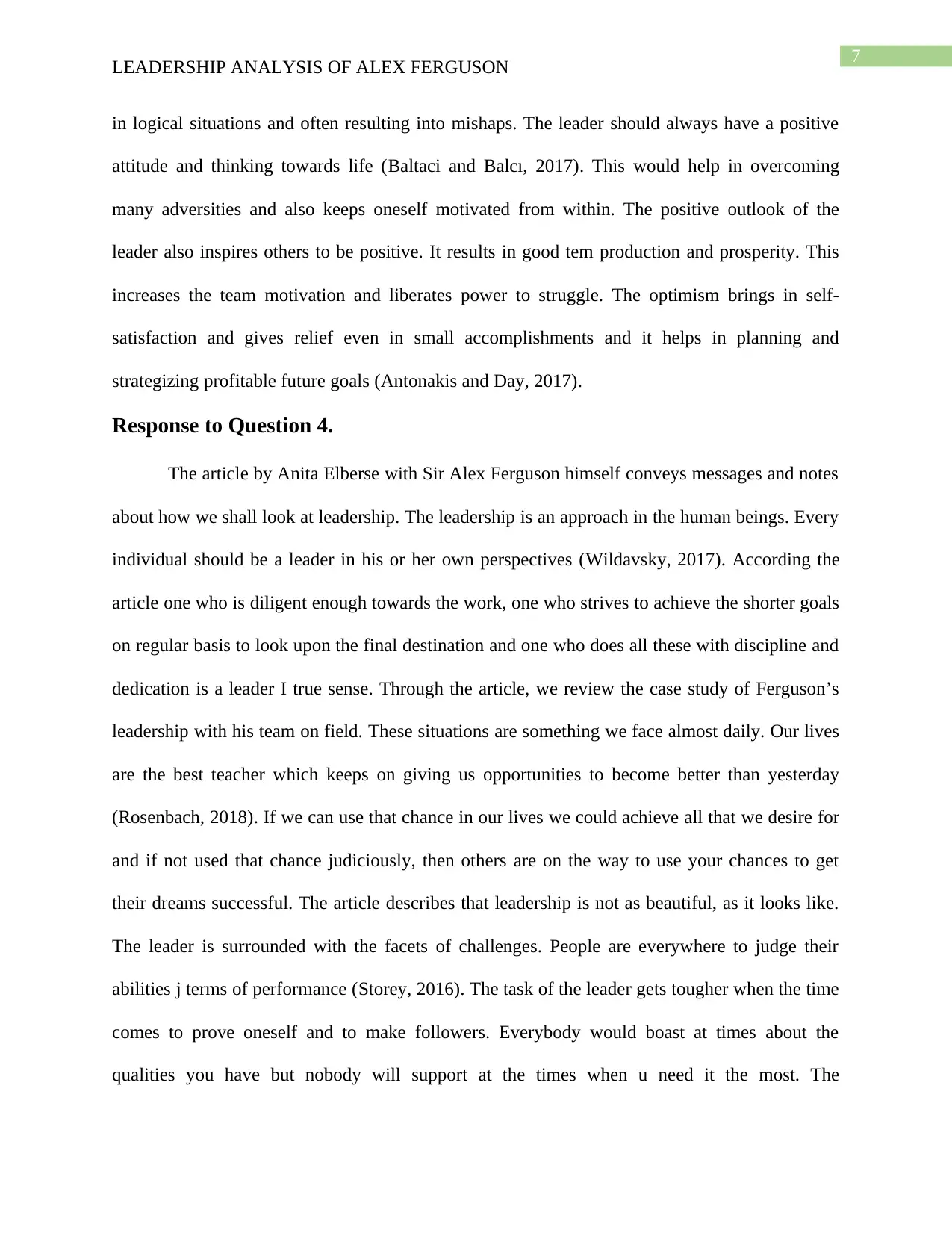
7
LEADERSHIP ANALYSIS OF ALEX FERGUSON
in logical situations and often resulting into mishaps. The leader should always have a positive
attitude and thinking towards life (Baltaci and Balcı, 2017). This would help in overcoming
many adversities and also keeps oneself motivated from within. The positive outlook of the
leader also inspires others to be positive. It results in good tem production and prosperity. This
increases the team motivation and liberates power to struggle. The optimism brings in self-
satisfaction and gives relief even in small accomplishments and it helps in planning and
strategizing profitable future goals (Antonakis and Day, 2017).
Response to Question 4.
The article by Anita Elberse with Sir Alex Ferguson himself conveys messages and notes
about how we shall look at leadership. The leadership is an approach in the human beings. Every
individual should be a leader in his or her own perspectives (Wildavsky, 2017). According the
article one who is diligent enough towards the work, one who strives to achieve the shorter goals
on regular basis to look upon the final destination and one who does all these with discipline and
dedication is a leader I true sense. Through the article, we review the case study of Ferguson’s
leadership with his team on field. These situations are something we face almost daily. Our lives
are the best teacher which keeps on giving us opportunities to become better than yesterday
(Rosenbach, 2018). If we can use that chance in our lives we could achieve all that we desire for
and if not used that chance judiciously, then others are on the way to use your chances to get
their dreams successful. The article describes that leadership is not as beautiful, as it looks like.
The leader is surrounded with the facets of challenges. People are everywhere to judge their
abilities j terms of performance (Storey, 2016). The task of the leader gets tougher when the time
comes to prove oneself and to make followers. Everybody would boast at times about the
qualities you have but nobody will support at the times when u need it the most. The
LEADERSHIP ANALYSIS OF ALEX FERGUSON
in logical situations and often resulting into mishaps. The leader should always have a positive
attitude and thinking towards life (Baltaci and Balcı, 2017). This would help in overcoming
many adversities and also keeps oneself motivated from within. The positive outlook of the
leader also inspires others to be positive. It results in good tem production and prosperity. This
increases the team motivation and liberates power to struggle. The optimism brings in self-
satisfaction and gives relief even in small accomplishments and it helps in planning and
strategizing profitable future goals (Antonakis and Day, 2017).
Response to Question 4.
The article by Anita Elberse with Sir Alex Ferguson himself conveys messages and notes
about how we shall look at leadership. The leadership is an approach in the human beings. Every
individual should be a leader in his or her own perspectives (Wildavsky, 2017). According the
article one who is diligent enough towards the work, one who strives to achieve the shorter goals
on regular basis to look upon the final destination and one who does all these with discipline and
dedication is a leader I true sense. Through the article, we review the case study of Ferguson’s
leadership with his team on field. These situations are something we face almost daily. Our lives
are the best teacher which keeps on giving us opportunities to become better than yesterday
(Rosenbach, 2018). If we can use that chance in our lives we could achieve all that we desire for
and if not used that chance judiciously, then others are on the way to use your chances to get
their dreams successful. The article describes that leadership is not as beautiful, as it looks like.
The leader is surrounded with the facets of challenges. People are everywhere to judge their
abilities j terms of performance (Storey, 2016). The task of the leader gets tougher when the time
comes to prove oneself and to make followers. Everybody would boast at times about the
qualities you have but nobody will support at the times when u need it the most. The
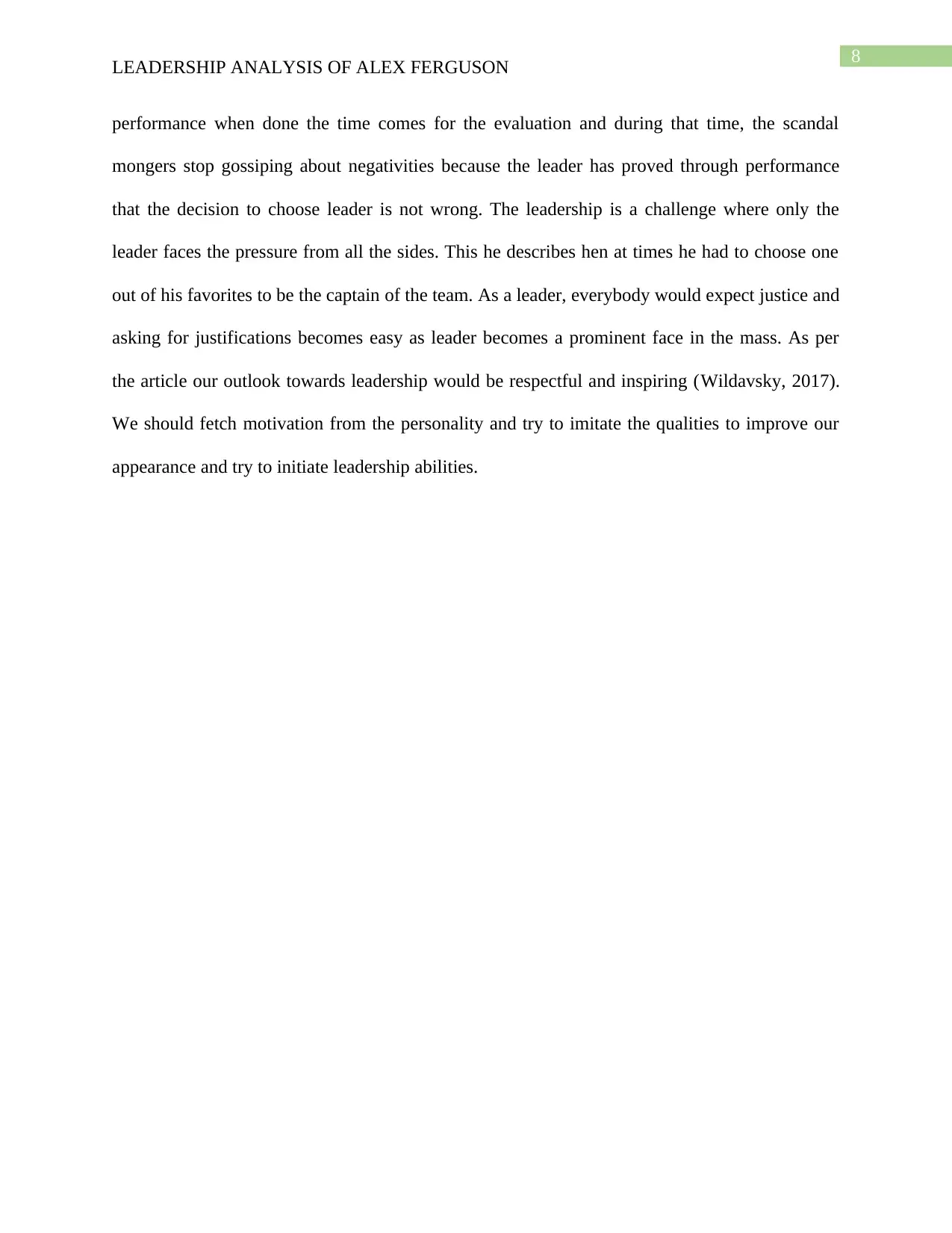
8
LEADERSHIP ANALYSIS OF ALEX FERGUSON
performance when done the time comes for the evaluation and during that time, the scandal
mongers stop gossiping about negativities because the leader has proved through performance
that the decision to choose leader is not wrong. The leadership is a challenge where only the
leader faces the pressure from all the sides. This he describes hen at times he had to choose one
out of his favorites to be the captain of the team. As a leader, everybody would expect justice and
asking for justifications becomes easy as leader becomes a prominent face in the mass. As per
the article our outlook towards leadership would be respectful and inspiring (Wildavsky, 2017).
We should fetch motivation from the personality and try to imitate the qualities to improve our
appearance and try to initiate leadership abilities.
LEADERSHIP ANALYSIS OF ALEX FERGUSON
performance when done the time comes for the evaluation and during that time, the scandal
mongers stop gossiping about negativities because the leader has proved through performance
that the decision to choose leader is not wrong. The leadership is a challenge where only the
leader faces the pressure from all the sides. This he describes hen at times he had to choose one
out of his favorites to be the captain of the team. As a leader, everybody would expect justice and
asking for justifications becomes easy as leader becomes a prominent face in the mass. As per
the article our outlook towards leadership would be respectful and inspiring (Wildavsky, 2017).
We should fetch motivation from the personality and try to imitate the qualities to improve our
appearance and try to initiate leadership abilities.
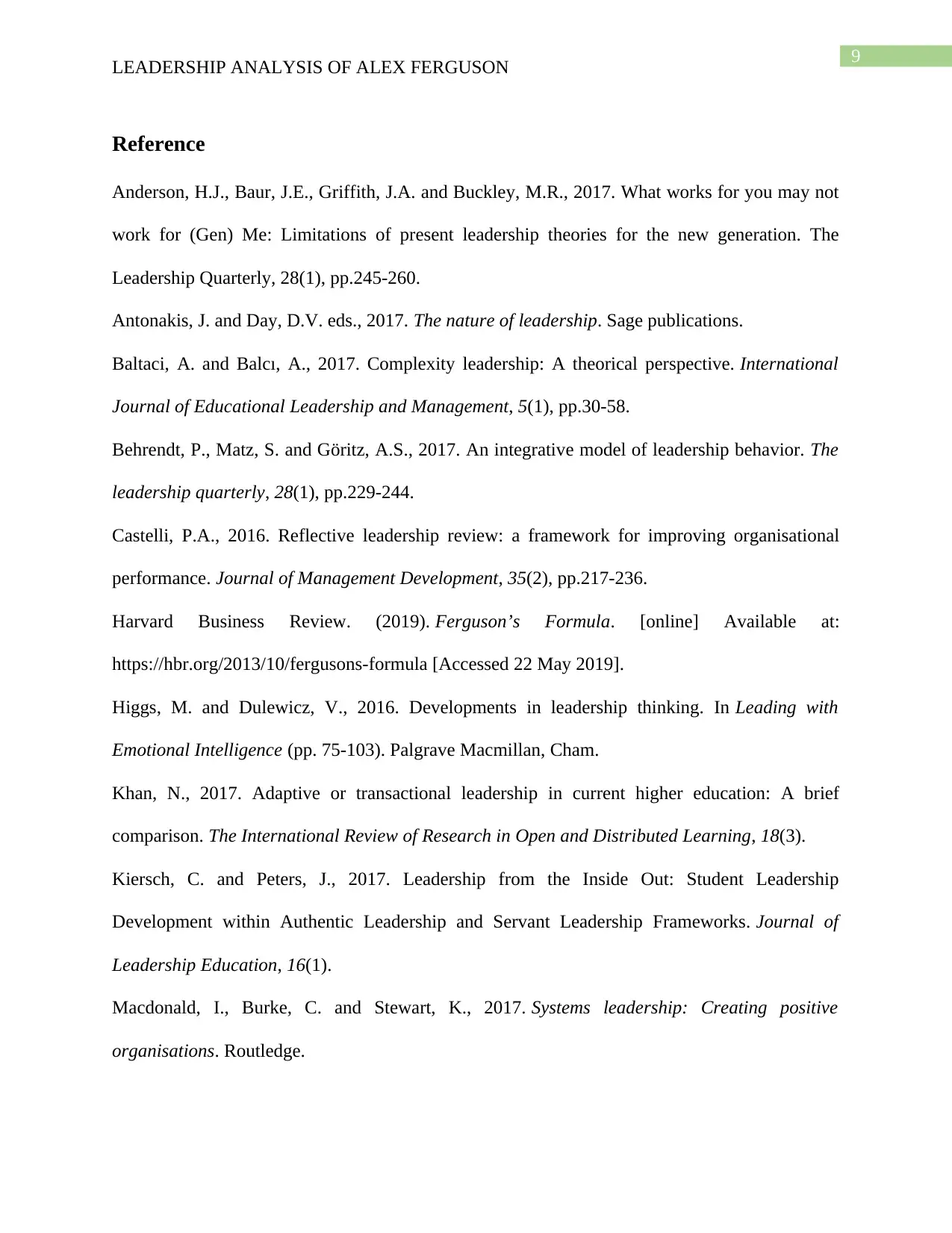
9
LEADERSHIP ANALYSIS OF ALEX FERGUSON
Reference
Anderson, H.J., Baur, J.E., Griffith, J.A. and Buckley, M.R., 2017. What works for you may not
work for (Gen) Me: Limitations of present leadership theories for the new generation. The
Leadership Quarterly, 28(1), pp.245-260.
Antonakis, J. and Day, D.V. eds., 2017. The nature of leadership. Sage publications.
Baltaci, A. and Balcı, A., 2017. Complexity leadership: A theorical perspective. International
Journal of Educational Leadership and Management, 5(1), pp.30-58.
Behrendt, P., Matz, S. and Göritz, A.S., 2017. An integrative model of leadership behavior. The
leadership quarterly, 28(1), pp.229-244.
Castelli, P.A., 2016. Reflective leadership review: a framework for improving organisational
performance. Journal of Management Development, 35(2), pp.217-236.
Harvard Business Review. (2019). Ferguson’s Formula. [online] Available at:
https://hbr.org/2013/10/fergusons-formula [Accessed 22 May 2019].
Higgs, M. and Dulewicz, V., 2016. Developments in leadership thinking. In Leading with
Emotional Intelligence (pp. 75-103). Palgrave Macmillan, Cham.
Khan, N., 2017. Adaptive or transactional leadership in current higher education: A brief
comparison. The International Review of Research in Open and Distributed Learning, 18(3).
Kiersch, C. and Peters, J., 2017. Leadership from the Inside Out: Student Leadership
Development within Authentic Leadership and Servant Leadership Frameworks. Journal of
Leadership Education, 16(1).
Macdonald, I., Burke, C. and Stewart, K., 2017. Systems leadership: Creating positive
organisations. Routledge.
LEADERSHIP ANALYSIS OF ALEX FERGUSON
Reference
Anderson, H.J., Baur, J.E., Griffith, J.A. and Buckley, M.R., 2017. What works for you may not
work for (Gen) Me: Limitations of present leadership theories for the new generation. The
Leadership Quarterly, 28(1), pp.245-260.
Antonakis, J. and Day, D.V. eds., 2017. The nature of leadership. Sage publications.
Baltaci, A. and Balcı, A., 2017. Complexity leadership: A theorical perspective. International
Journal of Educational Leadership and Management, 5(1), pp.30-58.
Behrendt, P., Matz, S. and Göritz, A.S., 2017. An integrative model of leadership behavior. The
leadership quarterly, 28(1), pp.229-244.
Castelli, P.A., 2016. Reflective leadership review: a framework for improving organisational
performance. Journal of Management Development, 35(2), pp.217-236.
Harvard Business Review. (2019). Ferguson’s Formula. [online] Available at:
https://hbr.org/2013/10/fergusons-formula [Accessed 22 May 2019].
Higgs, M. and Dulewicz, V., 2016. Developments in leadership thinking. In Leading with
Emotional Intelligence (pp. 75-103). Palgrave Macmillan, Cham.
Khan, N., 2017. Adaptive or transactional leadership in current higher education: A brief
comparison. The International Review of Research in Open and Distributed Learning, 18(3).
Kiersch, C. and Peters, J., 2017. Leadership from the Inside Out: Student Leadership
Development within Authentic Leadership and Servant Leadership Frameworks. Journal of
Leadership Education, 16(1).
Macdonald, I., Burke, C. and Stewart, K., 2017. Systems leadership: Creating positive
organisations. Routledge.
Secure Best Marks with AI Grader
Need help grading? Try our AI Grader for instant feedback on your assignments.
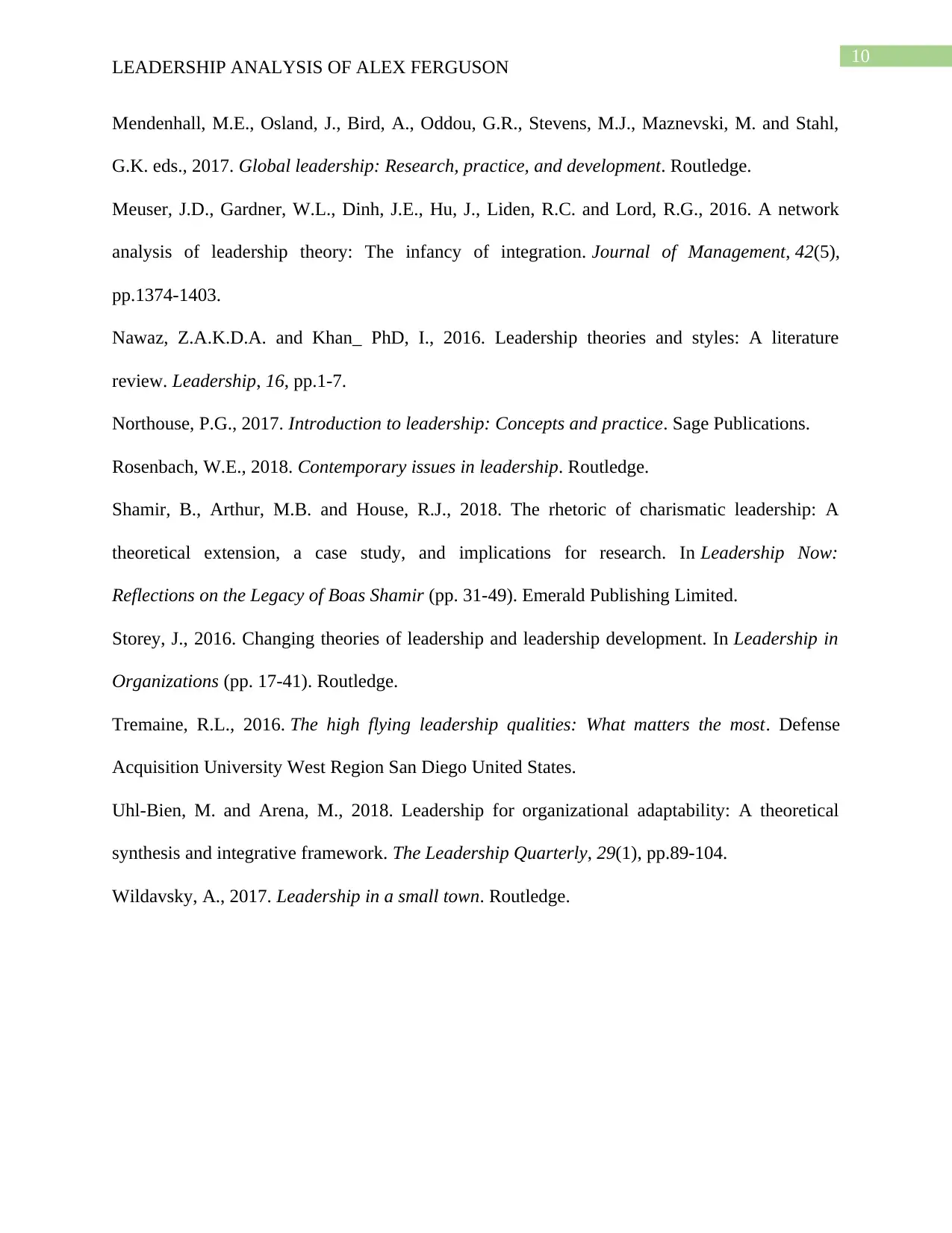
10
LEADERSHIP ANALYSIS OF ALEX FERGUSON
Mendenhall, M.E., Osland, J., Bird, A., Oddou, G.R., Stevens, M.J., Maznevski, M. and Stahl,
G.K. eds., 2017. Global leadership: Research, practice, and development. Routledge.
Meuser, J.D., Gardner, W.L., Dinh, J.E., Hu, J., Liden, R.C. and Lord, R.G., 2016. A network
analysis of leadership theory: The infancy of integration. Journal of Management, 42(5),
pp.1374-1403.
Nawaz, Z.A.K.D.A. and Khan_ PhD, I., 2016. Leadership theories and styles: A literature
review. Leadership, 16, pp.1-7.
Northouse, P.G., 2017. Introduction to leadership: Concepts and practice. Sage Publications.
Rosenbach, W.E., 2018. Contemporary issues in leadership. Routledge.
Shamir, B., Arthur, M.B. and House, R.J., 2018. The rhetoric of charismatic leadership: A
theoretical extension, a case study, and implications for research. In Leadership Now:
Reflections on the Legacy of Boas Shamir (pp. 31-49). Emerald Publishing Limited.
Storey, J., 2016. Changing theories of leadership and leadership development. In Leadership in
Organizations (pp. 17-41). Routledge.
Tremaine, R.L., 2016. The high flying leadership qualities: What matters the most. Defense
Acquisition University West Region San Diego United States.
Uhl-Bien, M. and Arena, M., 2018. Leadership for organizational adaptability: A theoretical
synthesis and integrative framework. The Leadership Quarterly, 29(1), pp.89-104.
Wildavsky, A., 2017. Leadership in a small town. Routledge.
LEADERSHIP ANALYSIS OF ALEX FERGUSON
Mendenhall, M.E., Osland, J., Bird, A., Oddou, G.R., Stevens, M.J., Maznevski, M. and Stahl,
G.K. eds., 2017. Global leadership: Research, practice, and development. Routledge.
Meuser, J.D., Gardner, W.L., Dinh, J.E., Hu, J., Liden, R.C. and Lord, R.G., 2016. A network
analysis of leadership theory: The infancy of integration. Journal of Management, 42(5),
pp.1374-1403.
Nawaz, Z.A.K.D.A. and Khan_ PhD, I., 2016. Leadership theories and styles: A literature
review. Leadership, 16, pp.1-7.
Northouse, P.G., 2017. Introduction to leadership: Concepts and practice. Sage Publications.
Rosenbach, W.E., 2018. Contemporary issues in leadership. Routledge.
Shamir, B., Arthur, M.B. and House, R.J., 2018. The rhetoric of charismatic leadership: A
theoretical extension, a case study, and implications for research. In Leadership Now:
Reflections on the Legacy of Boas Shamir (pp. 31-49). Emerald Publishing Limited.
Storey, J., 2016. Changing theories of leadership and leadership development. In Leadership in
Organizations (pp. 17-41). Routledge.
Tremaine, R.L., 2016. The high flying leadership qualities: What matters the most. Defense
Acquisition University West Region San Diego United States.
Uhl-Bien, M. and Arena, M., 2018. Leadership for organizational adaptability: A theoretical
synthesis and integrative framework. The Leadership Quarterly, 29(1), pp.89-104.
Wildavsky, A., 2017. Leadership in a small town. Routledge.
1 out of 11
Related Documents
Your All-in-One AI-Powered Toolkit for Academic Success.
+13062052269
info@desklib.com
Available 24*7 on WhatsApp / Email
![[object Object]](/_next/static/media/star-bottom.7253800d.svg)
Unlock your academic potential
© 2024 | Zucol Services PVT LTD | All rights reserved.





